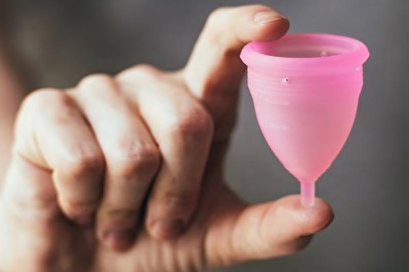TEHRAN, Jul 18 -They're gaining in popularity among women, and a new study finds menstrual cups to be just as safe and as effective as disposable pads or tampons.
 TEHRAN, Young Journalists Club (YJC) -British researchers looked at data on the cost-saving devices, gleaned from 43 studies involving more than 3,300 women and girls worldwide.
TEHRAN, Young Journalists Club (YJC) -British researchers looked at data on the cost-saving devices, gleaned from 43 studies involving more than 3,300 women and girls worldwide.
Reporting July 17 in The Lancet Public Health, the study authors said the research was sorely needed.
"Despite the fact that 1.9 billion women globally are of menstruating age -- spending on average 65 days a year dealing with menstrual blood flow -- few good quality studies exist that compare sanitary products," said review senior author Penelope Phillips-Howard of the Liverpool School of Tropical Medicine.
"We aimed to address this by summarizing current knowledge about leakage, safety and acceptability of menstrual cups, comparing them to other products where possible," she explained in a journal news release.
Rather than absorbing blood flow like pads and tampons, menstrual cups collect it. They are inserted into the vagina and emptied every four to 12 hours.
The cups also get around the need for women to continuously purchase disposable products -- such as tampons or pads --because they're made with medical-grade silicone, rubber or latex and can last up to 10 years.
One U.S. expert agreed that women need more information on menstrual cups.
Christine Metz is director of research in obstetrics and gynecology at North Shore University Hospital in Manhasset, N.Y. She said some female participants in research she's conducting "use menstrual cups and have provided positive feedback. In fact, many women who have switched prefer cups over other menstrual hygiene products."
But just how safe and effective are the devices? According to the new British review, four studies found that leakage levels were similar between menstrual cups and pads and tampons, while another study found menstrual cup leakage to be significantly less.
There was also no increased risk of infection associated with using menstrual cups, the data revealed. There were five reported cases of toxic shock syndrome following menstrual cup use, but the researchers couldn't compare this risk between menstrual cups and other products because the number of menstrual cup users was unknown.
Four of the studies found that the use of the menstrual cup had no harmful effect on "vaginal flora" -- the helpful bacteria found naturally in the vaginal tract. Studies that examined the vagina and cervix during follow-up also found no tissue damage due to menstrual cup use.
Some women did report difficulty in removing menstrual cups, the review found. Five women reported pain, three reported vaginal wounds, six reported an allergy or rash and nine reported urinary tract problems, according to the review.
On the other hand, cheap, safe and effective means of menstrual care are needed. The U.K. team noted that, globally, issues with the monthly cycle can affect girls' schooling and women's work, increase their odds for urogenital infections if they use poor-quality sanitary products, and make them targets of sexual violence or coercion if they can't afford sanitary products.
The researchers said there are also initiatives in many countries to combat so-called "period poverty" -- issues with the affordability of menstrual products. So, policy makers need to know which sanitary products to include in menstrual health programs and puberty-education materials.
In an editorial accompanying the study, Julie Hennegan of Johns Hopkins Bloomberg School of Public Health in Baltimore, wrote: "For consumers purchasing menstrual products, the results [of the new study] highlight cups as a safe and cost-effective option."
But she noted that too many girls and women aren't being told about the cups as an option.
The study "found that awareness of menstrual cups was low," Hennegan said. In fact, "only 30% of websites with educational materials on menarche [start of periods] included information about menstrual cups," she explained.
For her part, Metz said the new study shows that "there are cost and waste savings with menstrual cups," and women should "evaluate their utility for themselves."
Source: upi
 TEHRAN,
TEHRAN,